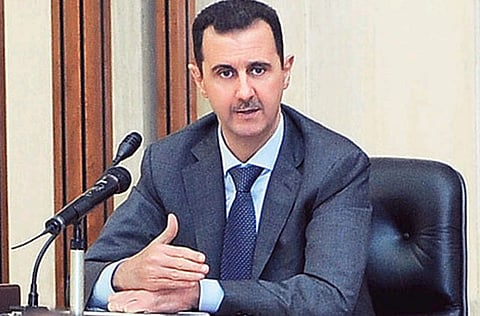Al Assad rejects comparison with Egypt, Libya
Al Assad blames the US for Syria problems

Berlin: Syrian President Bashar Al Assad said in an interview broadcast on Sunday that he is not afraid of meeting the same fate as the deposed and disgraced leaders of Libya and Egypt, saying he has nothing in common with them.
In one of his rare interviews with Western media since the deadly uprising in Syria erupted last year, Al Assad brushed off a question about whether he feared for his family, including his wife and three children.
“It’s a completely different situation,” he told German broadcaster ARD. “What’s happening in Egypt is different from what is happening in Syria ... You cannot compare,” he said.
He also rejected any comparisons with Libya, where rebels helped by Nato air strikes toppled the regime. Libyan leader Muammar Gaddafi was killed while fleeing advancing opposition fighters.
“Describing what happened to Gaddafi, this is savage, this is crime,” he said in the interview which was conducted in English.
The 16 months of upheaval in Syria, spurred by the Arab Spring’s pro-democracy movements across the Middle East, have left well over 14,000 people dead, according to activists. They accuse the autocratic ruler of crushing legitimate protests seeking reforms by waging a war against his own people.
But in the interview, the 46-year-old Al Assad who has ruled Syria since taking over from his father in 2000, accused the US of fuelling the uprising, saying that Washington ultimately bears responsibility for the deaths of innocent civilians in the Middle Eastern nation.
The US is partnering with those “terrorists ... with weapons, money or public and political support at the United Nations,” Al Assad said. “They offer the umbrella and political support to those gangs to ... destabilise Syria.”
Al Assad rejected responsibility of his security forces for the violence, claiming that “supporters of the government, the victims from the security and the army” far outnumber those among civilians.
Instead, he told ARD that an opposition made up of terrorists, gangs, “a mixture, an amalgam of Al Qaida [and] other extremists” is responsible for the violence.
When asked directly about the killing of more than 100 civilians in the Syrian village of Houla in May, he blamed it on gangs who “came in hundreds from outside the city.”
The massacre caused an international outcry, and UN investigators have since concluded that Syrian government troops could be behind the killings.
Al Assad said a “majority of the people ask for reforms, political reforms [but] not freedom.” He stressed that he still had the overall support of Syria’s people, firmly ruling out stepping down.
“The president shouldn’t run away from challenge and we have a national challenge now in Syria,” he said.
While he said he was ready for political dialogue with the opposition, Assad left no doubt that he would fight those his government perceives as terrorists.
“But as long as you have terrorism and as long as the dialogue didn’t work, you have to fight the terrorism. You cannot keep just making dialogue while they are killing your people and your army,” he said.
The main obstacles to a peaceful solution to the conflict are the nations supporting the opposition, namely Saudi Arabia and Qatar who send armaments, Turkey which helps with logistics and smuggling across the border and, finally, US political support, he said.



